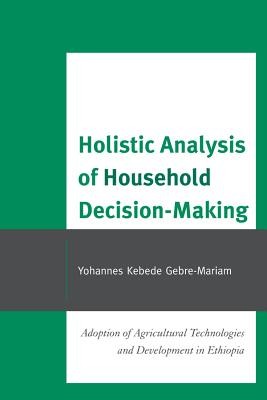
- We will send in 10–14 business days.
- Author: Yohannes Kebede Gebre-Mariam
- Publisher: University Press of America
- ISBN-10: 0761856412
- ISBN-13: 9780761856412
- Format: 15.2 x 22.9 x 2.6 cm, softcover
- Language: English
- SAVE -10% with code: EXTRA
Holistic Analysis of Household Decision-Making (e-book) (used book) | bookbook.eu
Reviews
Description
The processes and consequences of household decision-making are investigated using multi-disciplinary research methods of decision analysis that involves statistical, mathematical, psychological, anthropological, and econometric techniques brought together in a holistic manner. This study is focused in the Ada and Selale regions of the Central Ethiopian Highlands. The technologies studied are fertilizer, improved crop varieties, pesticides, and cross-bred cows. Goals and strategies of households, institutions, access to information, indigenous knowledge, risk taking behavior, and their impacts on household decision-making were studied. Technology adoption was studied under a variety of controllable (e.g., allocation of labor) and uncontrollable (natural factors such as rainfall or government intervention) environments. The findings demonstrated that agricultural producers can attain greater increases in food production and the efficiency with which it is produced if they adopt at least two innovations. The study revealed that non-physical resources such as indigenous knowledge and institutions play a fundamental role on the ability of producers to achieve increases in food production. For development to be sustained, therefore, investments in physical resources should be matched with those in non-physical resources.
EXTRA 10 % discount with code: EXTRA
The promotion ends in 8d.10:37:34
The discount code is valid when purchasing from 10 €. Discounts do not stack.
- Author: Yohannes Kebede Gebre-Mariam
- Publisher: University Press of America
- ISBN-10: 0761856412
- ISBN-13: 9780761856412
- Format: 15.2 x 22.9 x 2.6 cm, softcover
- Language: English English
The processes and consequences of household decision-making are investigated using multi-disciplinary research methods of decision analysis that involves statistical, mathematical, psychological, anthropological, and econometric techniques brought together in a holistic manner. This study is focused in the Ada and Selale regions of the Central Ethiopian Highlands. The technologies studied are fertilizer, improved crop varieties, pesticides, and cross-bred cows. Goals and strategies of households, institutions, access to information, indigenous knowledge, risk taking behavior, and their impacts on household decision-making were studied. Technology adoption was studied under a variety of controllable (e.g., allocation of labor) and uncontrollable (natural factors such as rainfall or government intervention) environments. The findings demonstrated that agricultural producers can attain greater increases in food production and the efficiency with which it is produced if they adopt at least two innovations. The study revealed that non-physical resources such as indigenous knowledge and institutions play a fundamental role on the ability of producers to achieve increases in food production. For development to be sustained, therefore, investments in physical resources should be matched with those in non-physical resources.


Reviews